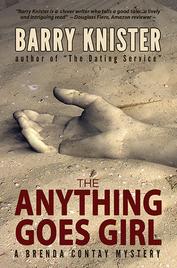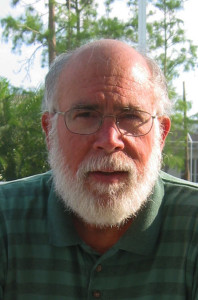by Barry Knister, @barryknister
When I first decided to write a mystery series, the initial problem I faced didn’t have to do with writing. It had to do with the crime business.
I’m not talking about the myriad ways in which crime is the business of criminals; I mean the crime-fighting experts who zigzag their way through a landscape littered with clues, in search of answers. We all know who the usual suspects are: police and CSI technicians, private investigators, FBI and CIA agents, medical examiners, lawyers, computer whizzes, etc.
But what if the writer is none of these things, and has no connections with such people?
In short, my challenge as a college English teacher was to find a way to write engaging mystery novels, but without having to act as though I knew what I definitely didn’t—methods of crime detection, the law and law enforcement, medicine, etc.
The author of the first-rate website you are reading, Elizabeth Spann Craig has come up with clever answers to the problem: the crime detectors in her cozy mysteries are amateur sleuths. They are barbeque cooks, bridge players, beauticians and quilters—small-town southern women whose skills are unrelated to the crime business, but whose wit and curiosity are equal to the task of tracking down criminals.
My own solution in The Anything Goes Girl was to create a central character who’s failed at most everything in her life. But almost by chance, Brenda Contay finds herself on TV–and she turns out to be good at shoot-from-the-lip broadcasting. When the story opens, she’s become a Detroit TV station’s popular Lightning Rod reporter.
The trouble is, Brenda is ashamed of what she does. Being successful can’t keep her from feeling tacky and humiliated about reporting on the sleazy underbelly of society. Yes, she was the “anything goes girl” in college, but she has standards.
But Brenda’s on-air stories aren’t what my novel series is about. Like Elizabeth Spann Craig’s amateur sleuths, Brenda Contay becomes involved in crimes committed against people she knows. This personal element, not professional training, is what motivates her to pursue answers.
Stories have to take place somewhere, so in The Anything Goes Girl, Brenda’s wish to escape from tabloid TV causes her to focus on the death of an old lover. All-state swimmer Vince Soublik drowned somewhere she’s never heard of–Micronesia. It makes no sense that he drowned, so Brenda is off and running. Her journey to the Pacific reveals what happened, and drops The Lightning Rod into more trouble than she ever dreamed possible.
Why Micronesia? That’s where I served in the Peace Corps. I may not have any first-hand knowledge about cadavers or interrogating suspects, but I do know a thing or two about the Eastern Caroline Islands.
In the second mystery (soon to be released), tentatively titled Love and Death at Kettle Falls,readers learn that Brenda has reaped success by writing a book about her experiences in Micronesia. Now freed from TV, she goes fishing with three other women to Minnesota’s Voyageur’s National Park, otherwise own as the Boundary Waters.
Here again, my ignorance poses a problem: am I a Hemingway type who can speak with authority about hunting and fishing? Ask my wife that questions, then step back and watch her topple over, holding her sides. But I have been to the beautiful Boundary Waters. By making the women in my story amateurs like me in the great out-of-doors, I free myself from needing to be Mark Trail.
In other words, among the many challenges I face in writing crime novels is the ignorance factor. I don’t want to compete with skillful authors who know more than I can hope to learn. But like me, my readers aren’t likely to be experts. Maybe they will be interested in tagging along with a central character who is more like themselves than, say, Patricia Cornwell’s Kay Scarpetta, or Michael Connelly’s Harry Bosch.
Until retiring in 2008, Barry Knister taught English at Lawrence Technological University in Southfield, Michigan. He is the past secretary of Detroit Working Writers, and a past director of the Cranbrook Writers Conference. His first novel, a thriller titled The Dating Service was published by Berkley. In addition toThe Anything Goes Girl, he has also published Just Bill, a short novel about dogs and owners living on a golf course in Florida. His website is www.bwknister.com. He welcomes your messages.

Use the elements you do know and avoid the ones you don’t. I wouldn’t know much about crime fighting experts outside of what I’ve learned watching CSI.
Alex–
If you add to CSI Law & Order, NYPD Blue and many other shows, you are speaking for me. But more importantly, I love reading well-written novels done by people who truly know what fighting crime is all about. I also enjoy crime fiction that pays more attention to character and dialogue. That’s why I’m a great fan of Elmore Leonard (RIP). His bad guys in particular are especially effective. Often, criminals are presented as both violent and intelligent. But Leonard’s heavies are usually really dumb, and completely unaware of this. As a consequence, they can be hilarious.
Thanks for this guest post, Barry!
And I know exactly what you mean. I was asked by my publisher to incorporate quilting into my series and I’m (sadly) not at all crafty. Making my protagonist a newbie to the art was the best way I could think of to handle this issue and put her on the same footing that I was on.
Elizabeth–
Appearing on your website, simply put, is an honor and a privilege.
As for newbies, that’s what my ladies are. Three of them have never fished, and the one who has–now an MS patient–no longer can. This clears the way for my good guy to step in and give some lessons.
Elizabeth – Thanks for hosting Barry.
Barry – I think you took some very wise decisions about Brenda. I always find novels and series so much more authentic if I can sense that the author is either writing from experience or writing, if I can put it this way, from inexperience.
Margot–
Thanks for being generous, and renaming my ignorance “inexperience.” Gore Vidal, always the contrarian, once said that conventional wisdom urging people to write what they knew was all wrong. Write about what you don’t know, he said. That way, you force yourself to learn something. But when you’ve seen crime detection and police work presented so well by so many, it seems goofy to compete. At least it seems so to me.
There is always some way we can connect, some knowledge we possess that will fit.
I have to hope you’re right. Some writers are great at devising plots. I’m not the best at this, but I hope readers will develop enough interest in my characters to want to know what happens to them.
Great essay. Wonderful point. Couldn’t agree more.
I’m in line for your new release now. I love “vacation” murder!
Well, then, if you like psychological probing with your crime reading, I have to hope you won’t be disappointed. What’s mostly going on in what I’m now calling Deep North is an odd trio of love stories, set in the Boundary Waters of northern Minnesota, blended with mayhem.
I have always been kind of intimidated by mysteries and the knowledge and skill one must possess to write them. I have an idea for one I’m tinkering with but I’m at a loss when it comes to being an expert or knowing an expert in the crime field. I’m ecstatic to learn that perhaps my inexperienced sleuths can see the light of day!! Thanks for the inspiration!!
Traci–
If I have in some modest way inspired you to pursue your idea, I am delighted. Just look at how many really wonderful novels that involve crime do not involve highly detailed use of the ins and outs of what I call the business of crime. Police may figure, but they are secondary to the conflicts and challenges that figure with the central characters. I love the best procedurals, but in the end I am especially intrigued by subtle and intelligent analysis of character. Of course, it should be said that the best police procedurals do just that.
Very interesting post. Like you, I find Elmore Leonard’s work to be excellent in all aspects. Will read your books, too.
CortlandWriter–
For me, Elmore Leonard is the gold standard, precisely for the reasons I’ve given. Yes, he always does his homework in terms of police procedure. But in the end, the main focus is on dialogue, and in that dialogue lives the nature of his characters. When they speak we know them, and they are–and least for me–always worth knowing. As for my own work, I hope I have learned a thing or two from Dutch Leonard, but I make no effort to imitate him. That would be futile.
Great post! I love learning alongside the main characters too!
Jemi–
You put it very well: learning alongside the characters. In fact, I don’t know how to express what I try to do better. I do my best to put my readers next to my characters, seeing and hearing what they see. I don’t want to tell them something, I want them to see it for themselves. Figure it out, come to their own conclusions. But of course I want how I’ve organized everything to lead them to see things a certain way. If I succeed in doing that, all well and good.
Barry, I love your cover!
I wrote my first mystery a couple of years ago and boy was it tough! I admire authors like Elizabeth even more now.
Julie–
The cover for my book comes courtesy of Blue Harvest Creative in Redford, Michigan. I hope it isn’t the best thing about The Anything Goes Girl, but it’s very good.
About Elizabeth: How she does it–all the books, her wonderful website (and don’t forget, she has to juggle everything , along with family)–I haven’t a clue. We’re all equal under the law, but stealing from George Orwell, I have to say some of us are more equal than others–and that would be Elizabeth.